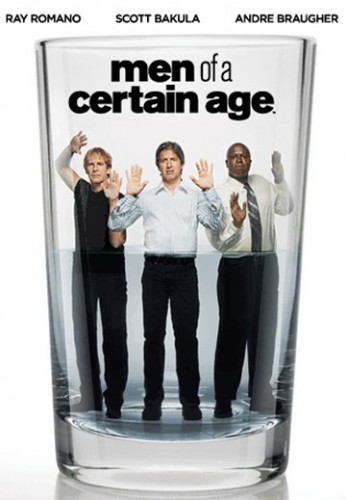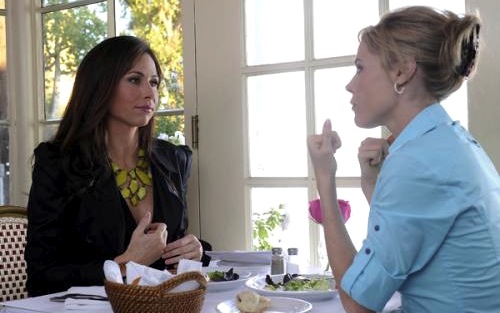
“We haven’t seen them in a while,” I hear myself observing every few weeks, usually in reference to friends with whom my wife and I have lost touch.
 Most of the time, the estrangement is logistical, schedules being what they are in a house with two working parents and two napping toddlers. But guilt nevertheless sets in and triggers defensiveness. Soon platitudes like “it takes two to tango” or “life happens” are being trotted out and before long, you’re castigating yourself or the other person(s), possibly deconstructing society as a whole, and any chance of reconnection has been essentially nullified.
Most of the time, the estrangement is logistical, schedules being what they are in a house with two working parents and two napping toddlers. But guilt nevertheless sets in and triggers defensiveness. Soon platitudes like “it takes two to tango” or “life happens” are being trotted out and before long, you’re castigating yourself or the other person(s), possibly deconstructing society as a whole, and any chance of reconnection has been essentially nullified.
Growing up, I always noticed how friendship didn’t seem to be an overwhelming priority for people in their 30s and 40s, men in particular. You had close friends in high school and college and your 20s perhaps, but those relationships often fell by the wayside during middle age, only to be taken up again once the tidal wave of responsibility subsided a bit. But now that I’m experiencing the same thing, I wonder if the circumstantial factors are largely a smokescreen.
In an Opinionator piece for the NY Times back in 2009, Tim Kreider theorized that the real distancing mechanism at work was something called “The Referendum.” An expanded version appeared in We Learn Nothing, from which the following excerpts are taken:
The Referendum is a phenomenon typical of (but not limited to) midlife, whereby people, increasingly aware of the finiteness of their time in the world, the limitations placed on them by their choices so far, and the narrowing options remaining to them, start judging their peers’ differing choices with reactions ranging from envy to contempt. The Referendum can subtly poison formerly close and uncomplicated relationships, creating tensions between the married and the single, the childless and parents, careerists and the stay-at-home… So we’re all anxiously sizing up how everyone else’s decisions have worked out to reassure ourselves that our own are vindicated — that we are, in some sense, winning…
In other words, the real reason certain types of relationships tail off during middle age is because these are the years when we are doing most of our “achieving”, when our capacity for comparison is arguably at its zenith, when the discrepancies are most pronounced.
Not surprisingly, the Referendum is exacerbated rather than assuaged by erstwhile closeness. Meaning, we can and do spend plenty of (happy) time in middle age with peers with whom we don’t share many natural affinities–the difficulty comes with those with whom we once did; the degree to which we identified with someone in college or high school will be the degree to which their current trajectory makes us feel uncomfortable. We see them as a living comment on what we are not. A law (of condemnation) rather than a person.
Not exactly rocket science, I know, nor the only reason why people grow apart, but a prevalent factor nonetheless, and perhaps part of what accounts for the U-Bend of Happiness.
Kreider takes things a little further, though, claiming that our once-and-future comrades represent alternate versions of ourselves. The “control group” in the experiment of our life–scary! I can only speak for the ministry-nonprofit side of this equation, but the dynamic is as widespread as it is transparent–which is to say, embarrassingly so. It’s occasionally even used as a bludgeon against those closest to us (i.e. “if you only knew how much money I left on the table when I signed up for this” or conversely “I gave up my dreams to support you!”). I’m sure social media is not helping things, especially when it comes to Marriage and Kids, which Kreider locates as the biggies:
I may be exceptionally conscious of the Referendum because my life is so different from most of my cohort’s; at 42 I’ve never been married and don’t want kids. I recently had dinner with some old friends, a couple with two small children, and when I told them about my typical Saturday in New York City — doing the Times crossword, stopping off at a local flea market, maybe biking across the Brooklyn Bridge — they looked at me like I was describing my battles with the fierce and elusive Squid-Men among the moons of Neptune…
I regard their more conventional domestic lives with the same sort of ambivalence. Like everyone, I’ve seen some marriages in which I would discreetly hang myself within 12 hours, but others have given me cause to envy their intimacy, loyalty, and irreplaceable decades of invested history…
Incisive stuff, as per usual, and it’s hard to disagree. Those who have children (or money, etc) don’t just lose touch with their friends who don’t over the years (and vice versa!) because they’re dealing with such supposedly different concerns, but because our identities are too fragile to be confronted with what “might have been”, good or ill, on a regular basis. This doesn’t mean we don’t still love those people. In fact, often the opposite is true; we circle the relational wagons to protect our self-justifications, not our hearts. Kreider goes on:
I have no real interest in people’s rationales for getting married or having kids, or for not doing so… I’m thankful my own modest pathology exempts me from having to handle feces or see Disney films or pretend to care about soccer. Nothing anyone says in defense of such major, irrevocable life choices is likely to be their real reason for making them; the number and vociferousness of our rationales is only an indication of how irrational and primal those decisions are. What interests me is the need to offer such justifications, to validate ourselves at the expense of others.
Yes: the Referendum gets unattractively self-righteous and judgmental. Quite a lot of what passes itself off as a dialogue about our society consists of people trying to justify their own choices (pursuing a creative career instead of making money; breastfeeding instead of formula; not having children in an overpopulated world) as the only right or natural ones by denouncing others’ as selfish or pathological or wrong. So it’s easy to overlook that it all arises out of insecurity. Hidden beneath all this smug certainty is a desperate cluelessness, and the naked 3 A.M. terror of regret.
Wowza. Having preached somewhat recently about the Parable of the Lost Sheep, I’m struck by the resonance. In that parable, Christ talks about the shepherd who leaves his flock of 99 sheep to go rescue the one who has gotten lost.
Of course, there are no 99 “who need no repentance” (i.e. who have no reason to feel insecure). That’s just a rhetorical device. In fact, the only possible consolation we can offer to those struggling with their “private (or public) sector doppelgaengers” is the reality that we are all lost sheep, both the 35 year-old who just closed on his third house and his one-time college roommate who recently moved into his umpteenth rental. Even the person with the staunchest determination and clearest direction in life cannot ultimately claim credit for it–they are just as subject to forces beyond their control as we are, just as in need of the gift of grace as anyone. Fear and sin may be expressing themselves differently (or in ostensibly more beneficial ways), but a lost sheep is still lost, regardless of where exactly they may have wandered off to.
More important, though: the shepherd’s joy is not dependent on the route of recovery, only its fact. Same with the justification of the ungodly. The lostness may feel relative, but the foundness is anything but.
I wish I could write more right now, but I unfortunately have to get home. You know, the kids.

COMMENTS
4 responses to “From the Archives: A Referendum on Midlife Friendships”
Leave a Reply















Don’t you have THREE kids now?
You only mentioned two sleeping toddlers.?